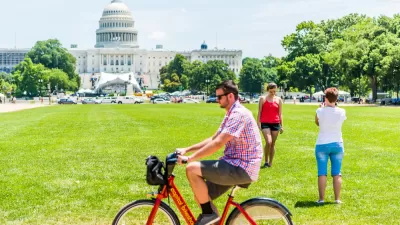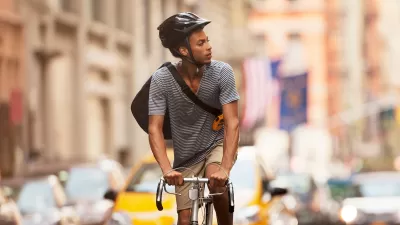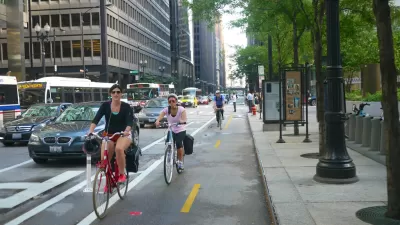While bike commuting remains below one percent as a regular transportation mode in the United States, the popularity of biking got a boost during the pandemic.

A report from The Bike Adviser outlines the state of bike commuting in the United States. “More and more Americans nowadays seem to value the exercise that they get from using the two-wheeled transport. From quicker and cheaper way of getting to and from work to more walkable neighborhoods and healthier people, biking is the source of many good things,” the report states.
Key findings include:
- “From 2000 to 2019, the number of commuters who bike to work increased from 488,000 to 786,000 or an increase of 61%,” although that number peaked at 904,463 in 2014 and has declined since then. “Oregon, Montana, Colorado, Wyoming and Washington ranked in the top 5 of all states with the largest percentage share of bike commuters.”
- “Of 786,000 people who commute by bike, 71% are men and about 29% are women.”
- According to the report, “Boasting excellent bike lanes and comprehensive bike safety laws, states like Oregon, Montana, Colorado, Wyoming and Washington have consistently ranked in the top 5 of all states for avid cyclists and exemplary infrastructure, advocacy, education and bike law enforcement.”
Despite its recent renaissance, bicycling remains the primary transportation mode for a small percentage of commuters. But as the report points out, the United States has a massive population. “At 0.6%, that’s a lot more bike commuters on our roads compared to many other countries in the world.” And “As cities around the US are wising up to the benefits of commuting by bike, miles of bike lanes are being added, making the streets safer and cracking down on dangerous car drivers threatening bike commuters.”
FULL STORY: The State of Bike Commuting in the U.S.

Alabama: Trump Terminates Settlements for Black Communities Harmed By Raw Sewage
Trump deemed the landmark civil rights agreement “illegal DEI and environmental justice policy.”

Study: Maui’s Plan to Convert Vacation Rentals to Long-Term Housing Could Cause Nearly $1 Billion Economic Loss
The plan would reduce visitor accommodation by 25% resulting in 1,900 jobs lost.

Planetizen Federal Action Tracker
A weekly monitor of how Trump’s orders and actions are impacting planners and planning in America.

Waymo Gets Permission to Map SF’s Market Street
If allowed to operate on the traffic-restricted street, Waymo’s autonomous taxis would have a leg up over ride-hailing competitors — and counter the city’s efforts to grow bike and pedestrian on the thoroughfare.

Parklet Symposium Highlights the Success of Shared Spaces
Parklets got a boost during the Covid-19 pandemic, when the concept was translated to outdoor dining programs that offered restaurants a lifeline during the shutdown.

Federal Homelessness Agency Places Entire Staff on Leave
The U.S. Interagency Council on Homelessness is the only federal agency dedicated to preventing and ending homelessness.
Urban Design for Planners 1: Software Tools
This six-course series explores essential urban design concepts using open source software and equips planners with the tools they need to participate fully in the urban design process.
Planning for Universal Design
Learn the tools for implementing Universal Design in planning regulations.
Caltrans
Smith Gee Studio
Institute for Housing and Urban Development Studies (IHS)
City of Grandview
Harvard GSD Executive Education
Toledo-Lucas County Plan Commissions
Salt Lake City
NYU Wagner Graduate School of Public Service





























